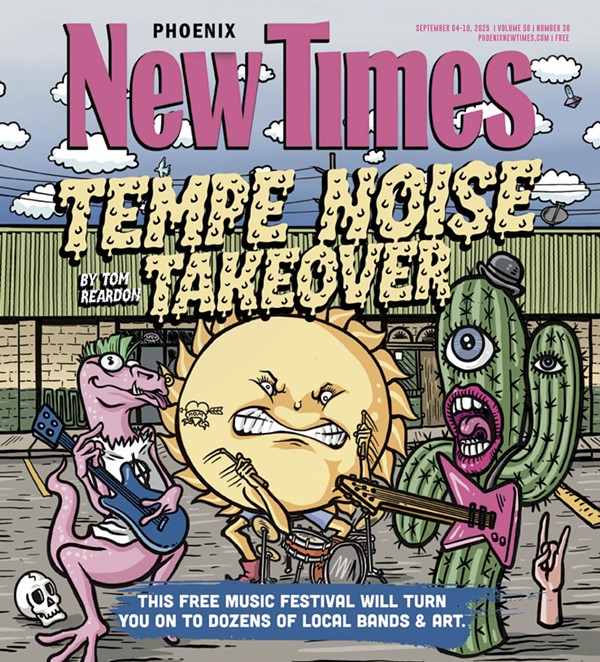Looks like we may have another Bono on our hands. Mills, son of British actress/teen dream Hayley Mills (remember Disney's The Parent Trap?), is never shy about expressing his rose-colored, quasi-mystical beliefs. So it must be reassuring to know the rest of Kula Shaker is behind him--well, sort of.
"He's quite mad, really," says Shaker drummer Paul Winter-Hart, snickering. "But we all kind of watch out for each other. I'll back Crispian 80 to 90 percent of the way, unless I think he's being a complete asshole about things."
Thus far, Kula Shaker's loopy camaraderie has saved Mills from gobbledygooking himself into a metaphysical corner. The Kulas are the latest chart sensation out of Britain, an all-seeking foursome whose unabashed sincerity and naive charms have inspired the U.K. music press to hail them as Brit-pop's kinder, gentler next coming (the last being Oasis), even as it pans the band's "hippy-dippy" sentiments.
All jacked up on Hindu philosophy and British Invasion nostalgia, the group has already chanted its way into the hearts of its countrymen with its debut release, K--to the tune of several weeks atop the U.K. charts. Stateside, K's swirly single "Tattva" ("eternal truth" in Sanskrit) is locked into regular rotation on modern-rock radio stations, coast to coast.
English rockers toying with Eastern influences--and mysticism--is an idea at least as old as the sitar part in "Norwegian Wood." Still, Kula Shaker--which takes its name from an Indian emperor and dedicates K to A.C. Bhaktivdanta Swami--effectively harnesses the musical and spiritual curiosity that was once at the heart of such dabbling. The group also rarely lets it get in the way of a good pop song. K is so catchy and agreeable, in fact, that it's liable to zip through one's transom without so much as a moment of peaked awareness. Blame it on the Manchester house grooves circa Happy Mondays and the Charlatans, but the late-'80s flashbacks are sweetened with a vintage icing of Mellotron and Hammond, shimmering layers of heavy guitar and Mills' striking vocals--think Ray Davies with more range and younger lungs.
Lyrically, Mills' occasional Sanskrit chanting and vaguely metaphorical rhyme schemes sound dopey apart from the music (a typically inane example: "Will I ever see the pleasure that will never end/Hidden in the misty forest that desire send"). But Kula Shaker doesn't claim dibs on anything fresh. It simply presents a well-stewed medley of British Invasion highlights, with a sarod here and a tabla there for that cool East-meets-West melting-pot effect.
"It's not like what we're doing is really amazing or complex," Winter-Hart says. "But it's very heartfelt; it's what we're about. It just happened; it evolved."
Winter-Hart says Kula's first worthwhile experiment with Eastern strains was "Govinda," a juiced-up version of an ancient Indian mantra written partly in Sanskrit. The band debuted the song at an outdoor festival in England.
"We found our way onto the Hare Krishna stage, and we just started jamming on 'Govinda.' There was probably 20 people at the start, and by the end there were about 100 people all staring up at Crispian. There were some devotees . . . and lots of spaced-out people on acid. They were flocking to the tent in droves."
Shortly thereafter, Mills toured India for the first time with his mystical friend and tour guide, Mathuoa, while the other guys stayed behind in England. "He took Crispian around to all these different areas," Winter-Hart says. "They did a lot of smoking, playing guitars and learning all these mantras."
While Winter-Hart plans to visit India some day, right now, he says, he's happy enough getting his karma secondhand from Mills, Mathuoa and bassist Alonza Bevan, who made the trip last December. As far as everyday-Kula lifestyles go, all the members are strict vegetarians, and Winter-Hart likens Kula keyboardist Jay Darlington to a modern-day guru in his own right, especially when touring.
"More like a monk, actually," he says. "No drinks, no caffeine, no girls on the road."
And what about the rest of the band? No limousines and no swimming pools (and certainly no limousines in swimming pools), says Winter-Hart. All that's really required is "a bit of country air" during downtime--along with a few minor amenities.
"At home we like going out to the mountains--preferably with some girls--in a van with some cushions in it," he says. "There's a song called '303' on K that's about going to Somerset [England] on this road called the 303. We smoke a bit of pot, have a little cider and lounge around."
Winter-Hart grew up breathing plenty of fresh air in the rural English town of Glastonbury. The son of a moonlighting jazz drummer who worked a menial day job to support his family, Winter-Hart was raised in a less glamorous and a more practical environment than Mills, whose cultured movieland upbringing meant he was never short on esoteric stimulation. For the record, Bevan's mother also acts and Darlington is the son of a teacher.
"I consider myself half-musician, half-bricklayer," says Winter-Hart. "It's not that I'm stupid; it's just that I've never had any particular ambition other than earning a living doing this."
Winter-Hart hooked up with Mills and Bevan through a "drummer needed" ad in the ubiquitous U.K. music publication Melody Maker. Mills and Bevan had been school chums before they began playing together in various bands, none of which went anywhere. Winter-Hart came aboard in the early '90s; a little later, they found Darlington, an old party-circuit acquaintance, and began calling themselves the Kays. By the time they signed a deal with Columbia U.K. in 1995, they'd become Kula Shaker, and within months, their contract was extended to the United States. K came along soon after, and the band's homeland was quick to take notice: The inevitable critical backlash (which comes faster and more often in England than it does here) barely had time to simmer before Kula Shaker were superstars in Britain.
If the day ever comes when Kula Shaker is as mighty as Oasis on both sides of the pond, Winter-Hart gives his assurance that the band won't be spitting on its audience to get its message across.
"We're a hundred miles apart," he says. "Oasis has a nihilistic sort of outlook on things, and we're much more about positivity and things actually representing something. Crispian and Liam [Oasis lead singer Gallagher] both have nice eyes, but that's as far as it goes, really."
Kula Shaker is scheduled to perform on Saturday, April 5, at Electric Ballroom in Tempe, with Headswim. Showtime is 9 p.m. (all ages).












